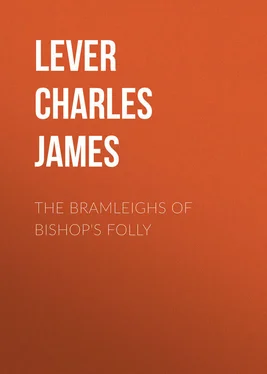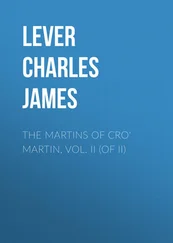Charles Lever - The Bramleighs of Bishop's Folly
Здесь есть возможность читать онлайн «Charles Lever - The Bramleighs of Bishop's Folly» — ознакомительный отрывок электронной книги совершенно бесплатно, а после прочтения отрывка купить полную версию. В некоторых случаях можно слушать аудио, скачать через торрент в формате fb2 и присутствует краткое содержание. Издательство: Иностранный паблик, Жанр: literature_19, foreign_antique, foreign_prose, на английском языке. Описание произведения, (предисловие) а так же отзывы посетителей доступны на портале библиотеки ЛибКат.
- Название:The Bramleighs of Bishop's Folly
- Автор:
- Издательство:Иностранный паблик
- Жанр:
- Год:неизвестен
- ISBN:нет данных
- Рейтинг книги:4 / 5. Голосов: 1
-
Избранное:Добавить в избранное
- Отзывы:
-
Ваша оценка:
- 80
- 1
- 2
- 3
- 4
- 5
The Bramleighs of Bishop's Folly: краткое содержание, описание и аннотация
Предлагаем к чтению аннотацию, описание, краткое содержание или предисловие (зависит от того, что написал сам автор книги «The Bramleighs of Bishop's Folly»). Если вы не нашли необходимую информацию о книге — напишите в комментариях, мы постараемся отыскать её.
The Bramleighs of Bishop's Folly — читать онлайн ознакомительный отрывок
Ниже представлен текст книги, разбитый по страницам. Система сохранения места последней прочитанной страницы, позволяет с удобством читать онлайн бесплатно книгу «The Bramleighs of Bishop's Folly», без необходимости каждый раз заново искать на чём Вы остановились. Поставьте закладку, и сможете в любой момент перейти на страницу, на которой закончили чтение.
Интервал:
Закладка:
Your own doting sister,
Augusta Bramleigh.
After much thought and many misgivings I deemed it advisable to offer to take one of the girls with me, leaving it open, to mark my indifference, as to which it should be. They both however refused, and, to my intense relief, declared that they did not care to come abroad; Augustus also protesting that it was a plan he could not approve of. The diplomatist alone opined that the project had anything to recommend it; but as his authority, like my own, in the family, carries little weight, we were happily outvoted. I have, therefore, the supreme satisfaction – and is it not such? – of knowing that I have done the right thing, and it has cost me nothing; like those excellent people who throw very devout looks towards heaven, without the remotest desire to be there.
CHAPTER III. “THE EVENING AFTER A HARD RUN.”
It was between eight and nine o’clock of a wintry evening near Christmas; a cold drizzle of rain was falling, which on the mountains might have been snow, as Mr. Drayton, the butler at the great house, as Castello was called in the village, stood austerely with his back to the fire in the dining-room, and, as he surveyed the table, wondered within himself what could possibly have detained the young gentlemen so late. The hounds had met that day about eight miles off, and Colonel Bramleigh had actually put off dinner half an hour for them, but to no avail; and now Mr. Drayton, whose whole personal arrangements for the evening had been so thoughtlessly interfered with, stood there musing over the wayward nature of youth, and inwardly longing for the time when, retiring from active service, he should enjoy the ease and indulgence his long life of fatigue and hardship had earned.
“They’re coming now, Mr. Drayton,” said a livery-servant, entering hastily. “George saw the light of their cigars as they came up the avenue.”
“Bring in the soup, then, at once, and send George here with another log for the fire. There’ll be no dressing for dinner to-day, I ‘ll be bound;” and imparting a sort of sarcastic bitterness to his speech, he filled himself a glass of sherry at the sideboard and tossed it off, – only just in time, for the door opened, and a very noisy, merry party of four entered the room, and made for the fire.
“As soon as you like, Drayton,” said Augustus, the eldest Bramleigh, a tall, good-looking, but somewhat stern-featured man of about eight-and-twenty. The second, Temple Bramleigh, was middle-sized, with a handsome but somewhat over-delicate-looking face, to which a simpering affectation of imperturbable self-conceit gave a sort of puppyism; while the youngest, Jack, was a bronzed, bright-eyed, fine-looking fellow, manly, energetic, and determined, but with a sweetness when he smiled and showed his good teeth that implied a soft and very impressionable nature. They were all in scarlet coats, and presented a group strikingly good-looking and manly. The fourth of the party was, however, so eminently handsome, and so superior in expression as well as lineament, that the others seemed almost vulgar beside him. He was in black coat and cords, a checked cravat seeming to indicate that he was verging, so far as he might, on the limits of hunting costume; for George L’Estrange was in orders, and the curate of the parish in which Castello stood. It is not necessary to detain the reader by any lengthened narrative of the handsome young parson. Enough to say, that it was not all from choice he had entered the Church, – narrow fortune, and the hope of a small family living, deciding him to adopt a career which, to one who had a passion for field-sports, seemed the very last to gratify his tastes. As a horseman he was confessedly the first in the country round; although his one horse – he was unable to keep a second – condemned him to rare appearance at the meets. The sight of the parson and his black mare, Nora Creina, in the field, were treated with a cheer, for he was a universal favorite, and if a general suffrage could have conferred the episcopate, George would have had his mitre many a day ago.
So sure a seat and so perfect a hand needed never to have wanted a mount. There was not a man with a stable who would not have been well pleased to see his horse ridden by such a rider; but L’Estrange declined all such offers, – a sensitive fear of being called a hunting parson deterred him; indeed, it was easy to see by the rarity with which he permitted himself the loved indulgence, what a struggle he maintained between will and temptation, and how keenly he felt the sacrifice he imposed upon himself.
Such, in brief, was the party who were now seated at table, well pleased to find themselves in presence of an admirable dinner, in a room replete with every comfort.
The day’s run, of course, formed the one topic of their talk, and a great deal of merriment went on about the sailor-like performances of Jack, who had been thrown twice, but on the whole acquitted himself creditably, and had taken one high bank so splendidly as to win a cheer from all who saw him.
“I wish you had not asked that poor Frenchman to follow you, Jack,” said Augustus; “he was really riding very nicely till he came to that unlucky fence.”
“I only cried out, ‘Venez donc, monsieur,’ and when I turned my head, after clearing the bank, I saw his horse with his legs in the air and monsieur underneath.”
“When I picked him up,” broke in L’Estrange, “he said, ‘Merci mille fois, monsieur,’ and then fainted off, the poor fellow’s face actually wearing the smile of courtesy he had got up to thank me.”
“Why will Frenchmen try things that are quite out of their beat?” said Jack.
“That’s a most absurd prejudice of yours, Master Jack,” cried the diplomatist. “Frenchmen ride admirably, now-a-days. I’ve seen a steeple-chase in Normandy, over as stiff a course, and as well ridden, as ever Leicestershire witnessed.”
“Yes, yes; I’ve heard all that,” said the sailor, “just as I ‘ve heard that their iron fleet is as good, if not better, than our own.”
“I think our own newspapers rather hint that,” said L’Estrange.
“They do more,” said Temple; “they prove it. They show a numerical superiority in ships, and they give an account of guns and weight of metal dead against us.”
“I ‘ll not say anything of the French; but this much I will say,” cried the sailor; “the question will have to be settled one of these days, and I ‘m right glad to think that it cannot be done by writers in newspapers.”
“May I come in?” cried a soft voice; and a very pretty head, with long fair ringlets, appeared at the door.
“Yes. Come by all means,” said Jack; “perhaps we shall be able, by your help, to talk of something besides fighting Frenchmen.”
While he spoke, L’Estrange had risen, and approached to shake hands with her.
“Sit down with us, Nelly,” said Augustus, “or George will get no dinner.”
“Give me a chair, Drayton,” said she; and, turning to her brother, added, “I only came in to ask some tidings about an unlucky foreigner; the servants have it he was cruelly hurt, some think hopelessly.”
“There’s the culprit who did the mischief,” said Temple, pointing to Jack; “let him recount his feat.”
“I ‘m not to blame in the least, Nelly. I took a smashing high bank, and the little Frenchman tried to follow me and came to grief.”
“Ay, but you challenged him to come on,” said Temple. “Now, Master Jack, people don’t do that sort of thing in the hunting-field.”
“I said, ‘Come along, monsieur,’ to give him pluck. I never thought for a moment he was to suffer for it.”
“But is he seriously hurt?” asked she.
Читать дальшеИнтервал:
Закладка:
Похожие книги на «The Bramleighs of Bishop's Folly»
Представляем Вашему вниманию похожие книги на «The Bramleighs of Bishop's Folly» списком для выбора. Мы отобрали схожую по названию и смыслу литературу в надежде предоставить читателям больше вариантов отыскать новые, интересные, ещё непрочитанные произведения.
Обсуждение, отзывы о книге «The Bramleighs of Bishop's Folly» и просто собственные мнения читателей. Оставьте ваши комментарии, напишите, что Вы думаете о произведении, его смысле или главных героях. Укажите что конкретно понравилось, а что нет, и почему Вы так считаете.












